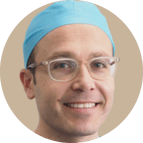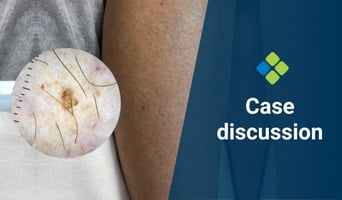In this webinar and Q&A, solicitor and former regulator David Gardner provides exclusive insights...

Round out your clinical knowledge in geriatric medicine with a comprehensive study of common conditions seen in older patients.

Enhance your clinical aptitude in managing common conditions seen in patients aged 65+.
GPs are well-positioned to focus on the prevention and early detection of chronic health issues in elderly patients. Utilise your understanding of your patients' social and medical history to provide effective primary healthcare that helps reduce morbidity and mortality.
- Manage health issues of the growing ageing population.
- Address the complex medical needs of geriatric patients.
- Provide comprehensive care to enhance patients' quality of life and overall wellbeing.
- This course is for medical doctors, International Medical Graduates, registered nurses, and degree-qualified health professionals.
- CPD-accredited and university-reviewed.
- Gain the skills to provide much needed, high-demand healthcare services, as people aged 65+ account for 20 per cent of presentations to emergency departments and nine per cent of hospital admissions in Australia.
- Safeguard your elderly patients by screening them for prevalent conditions of the heart and vascular system.
- Diagnose and manage patients with COPD.
- Manage prostate conditions in your elderly male patients and learn to perform prostate checks.
- Screen elderly female patients for conditions often arising after menopause, and help make a difference in their lives.
If you're not interested in pursuing a full certificate in this field but simply want to enhance your skills in specific topics covered in this course, you can access the content of this and other courses for a flat fee of $83 per month (paid annually) within HealthCert 365.

Director, MONARC (Monash Ageing Research Centre), Monash University
Head, Academic Unit of Geriatric Medicine, MONARC, Monash University
Professor of Geriatric Medicine, Monash University
Medical Director, Rehabilitation and Aged Care Services, Monash Health (Retired March 2021)
The Professional Certificate of Geriatric Medicine has been independently reviewed by Professor Barbara Workman, Medical Director (Rehabilitation and Aged Care Services) at Monash Health. Formerly, Prof Workman was a Professor of Geriatric Medicine at Monash University.

Urological and Prosthetic Surgeon
Leader, Andrology Special Advisory Group, Urological Society of Australia and New Zealand
Associate Professor Darren Katz is a urological surgeon who serves as Medical Director of Men’s Health Melbourne. He is a very approachable urologist who understands the importance of providing patients with the highest standards of multi-disciplinary care. His aim is to deliver prompt, ready-access to all forms of urological management – either elective or emergency - and is available 24/7 to GPs and patients.
A/Prof Katz is the current Leader of the Andrology Special Advisory Group for the Urological Society of Australia and New Zealand. He graduated from Melbourne University Medical School in 2001 and completed his urological training with the Royal Australasian College of Surgeons. He has spent two years at world-leading hospitals - Memorial Sloan-Kettering Cancer Center and Weill-Cornell Medical Centre - in New York completing sub-speciality urological fellowships in andrology, urological prosthetics, male voiding dysfunction, incontinence, and male infertility.
A/Prof Katz is the director of the only Australian Prosthetic and Micro-surgical Fellowship which trains overseas urologists in world-leading procedures and operations. A/Prof Katz has trained urologists from USA, Canada, Israel, and England. These urologists spend one year with A/Prof Katz and his colleagues learning about the latest treatments and operations in his field of focus.
A/Prof Katz is heavily involved with research and academics and has been awarded both national and international grants and scholarships. He has been an invited faculty member for numerous urological workshops to teach other urologists and training urologists about the latest surgical techniques. He often presents at major international conferences. He is the author of multiple peer-reviewed journal articles and serves as a reviewer for the Journal of Urology, British Journal of Urology International, Andrology, Asian Journal of Urology, Journal of Sexual Medicine, The Asian Journal of Andrology, and the Journal of Andrology and Gynaecology: Current Research. He is involved with several clinical trials and provides the most up-to-date, evidence-based treatments for his patients.
A/Prof Katz is a member of the Urological Society of Australia and New Zealand, The Fertility Society of Australia, The American Urological Association, The European Association of Urology, and The Sexual Medicine Society of North America.

Certificate of Family Planning, Graduate Diploma of Medical Education
Associate Professor Debbie Kors is the founder and joint owner of a private teaching general practice in Port Macquarie, Australia. She works there as a general practitioner and GP supervisor of GP registrars and medical students.
A/Prof Kors is a passionate advocate for the profession of general practice. She is a Conjoint Associate Professor in Primary Health Care at the UNSW Rural Clinical School, Port Macquarie campus and has previously worked as a senior medical educator with North Coast GP Training. In 2010, she was nominated for and won the General Practice Education and Training GP Supervisor of the Year award.
A/Prof Kors holds a MBBS (first class honours), Fellowship of the RACGP, Masters of Family Medicine (clinical), Diploma of the Royal Australian College of Obstetricians and Gynaecologists, Graduate Diploma of Medical Education and a Certificate of Family Planning.

.png?width=144&height=144&name=Joe%20Kosterich%20(3).png)


Study at your own pace and to your own schedule. Interactivity, discussion, and feedback opportunities are included.

Easily meet your CPD requirements and gain valuable skills – all in one place for $83 per month.
$1595
Bundle two courses and save 5%, or three courses and save 10% upon enrolment.
Talk to us about deferred payment options, registrar scholarships and special rates.


HealthCert courses have become the standard by which you gauge all others.
Dr K. Abolarinwa
Good courses with excellent speakers. I particularly enjoyed the case study scenarios which helped to integrate the knowledge gained.
Dr A. Tucker
This is the pathway to improve your confidence and evolve into the GP you aspire to be.
Dr S. Shinwari
| RACGP Activity Number | ACRRM Activity Number | Activity Title | Education Hours | Performance Hours | Outcome Hours | ||
|---|---|---|---|---|---|---|---|
| 441343 | 31081 | Chronic Obstructive Pulmonary Disease (COPD) | 441343 | 31081 | 4.5 | 6 | 0 |
| 477057 | 31217 | Prostate conditions | 477057 | 31217 | 4 | 6 | 0 |
| 469416 | 31196 | Post menopause health issues | 469416 | 31196 | 4.5 | 6 | 0 |
| 788775 | 32786 | Atrial fibrillation | 788775 | 32786 | 4 | 6 | 0 |
| 442738 | 31089 | Coronary Artery Disease | 442738 | 31089 | 4.5 | 6 | 0 |
| 822022 | 33211 | Peripheral arterial disease | 822022 | 33211 | 4 | 6 | 0 |
| 441329 | 31080 | Congestive cardiac failure | 441329 | 31080 | 4.5 | 6 | 0 |
| 995989 | 34670 | Varicose veins, ulcers and DVT | 995989 | 34670 | 4 | 5 | 0 |
| 1194513 | 36235 | Clinical Audit of Geriatric Medicine: Osteoporosis | 1194513 | 36235 | 0 | 2 | 19.5 |
| Total hours | 34 | 49 | 19.5 | ||||
View the CPD Hours for all HealthCert Education activities.
The peer-reviewed comprehensive clinical audit associated with this professional diploma exceeds the annual CPD outcome measurement hours.
The Professional Diploma of Geriatric Medicine is suitable for medical doctors, International Medical Graduates, registered nurses, and degree-qualified health professionals. The prerequisite of this course is the HealthCert Advanced Certificate of Geriatric Medicine.
Participants do not have to pass an IELTS test but, as the courses are delivered in English, proficiency in listening, reading and writing English is assumed.
Participants will require access to a computer/laptop, an internet connection and a basic level of technology proficiency to access and navigate the online learning portal.
Professional Diploma courses are at the highest level at HealthCert. The HealthCert Professional Diploma is a combination of course activities and clinical audit. There are additional professional requirements and submission of patient cases (clinical audit). A literature review must also be completed on journal articles.
Professionally recognised qualifications and prior studies may be recognised for entry into this course if the learning outcomes match exactly. Please ask a HealthCert Education Advisor for an individual assessment of your prior qualifications and experience.
This certificate course meets the minimum 50 hours CPD annual requirement across all three mandatory CPD activity types.
Upon successful completion of the course requirements, course participants will receive the Professional Diploma of Geriatric Medicine and CPD hours.
This certificate course:
To learn more about the delivery of certificates in Australia and overseas, please visit our FAQs.
Professional Diploma pathway
This course is the last stage of the three-part professional diploma pathway. The full pathway is: Professional Certificate of Geriatric Medicine, Advanced Certificate of Geriatric Medicine, Professional Diploma of Geriatric Medicine.
Postgraduate pathway
Graduates of the HealthCert Professional Diploma of Geriatric Medicine qualify for a scholarship into the Master of Science: Care of the Elderly. This is an online course from the UK designed for medical practitioners. Please contact our UK partner directly regarding this scholarship. Learn more.
This organisation is an RACGP-accredited CPD provider under the RACGP CPD Program.



Don't see your question? Explore other faqs or talk to us.
Fees will vary based on the program and study option selected (fully online vs online + optional practical workshop). Payments can be made upfront or in monthly instalments. Special rates and various payment options are available. GP registrars and doctors in training enjoy a scholarship of up to $500. Talk to us to learn more.
Completion of any HealthCert course or attendance at an event will enable you to access the HealthCert Alumni Program which includes:
HealthCert Education is pleased to issue digital credentials for alumni. Digital credentials are a permanent online record of your successful completion of a HealthCert course and are issued to all course participants in addition to PDF certificates. If you are based in Australia, you also have the option to order a hard copy of your digital certificate for a small additional fee.
The recommended study duration of this certificate course is 102.5 hours, which includes study of the pre-course activities and readings, online lectures, live tutorials, and online assessment. This self-paced course offers the flexibility of 100% online study in your own time, at your own pace, in your own home or office, with no mandatory face-to-face requirements. You are not required to be online at specific times but can view and replay video lectures at your convenience.
All HealthCert courses meet World Federation of Medical Education standards. This certificate course qualifies for CPD hours from the Royal Australian College of General Practitioners (RACGP) and the Australian College of Rural and Remote Medicine (ACRRM) in Australia. It is recognised by the Royal New Zealand College of General Practitioners (RNZCGP) in New Zealand. It is recognised by the Hong Kong College of Family Physicians (HKCFP) in China. It is a self-submitted activity in Dubai and the United Kingdom. It is a self-submitted activity through the College of Family Physicians in Canada. If you live or work outside one of the above-mentioned countries, please contact us on admin@healthcert.com to discuss whether this course can be recognised in your country.

In this webinar and Q&A, solicitor and former regulator David Gardner provides exclusive insights...

This week's case discussion, submitted by Dr Heather Lawson, features a 64-year-old female patient...

Mood changes in the postpartum period are extremely common, ranging from mild and transient “baby...
Want to stay up-to-date with the latest case studies, podcasts, free video tutorials and medical research articles pertinent to primary care?
Our Education Advisors can assist you with any queries and tailor our education pathway to suit your current expertise, interests and career goals.